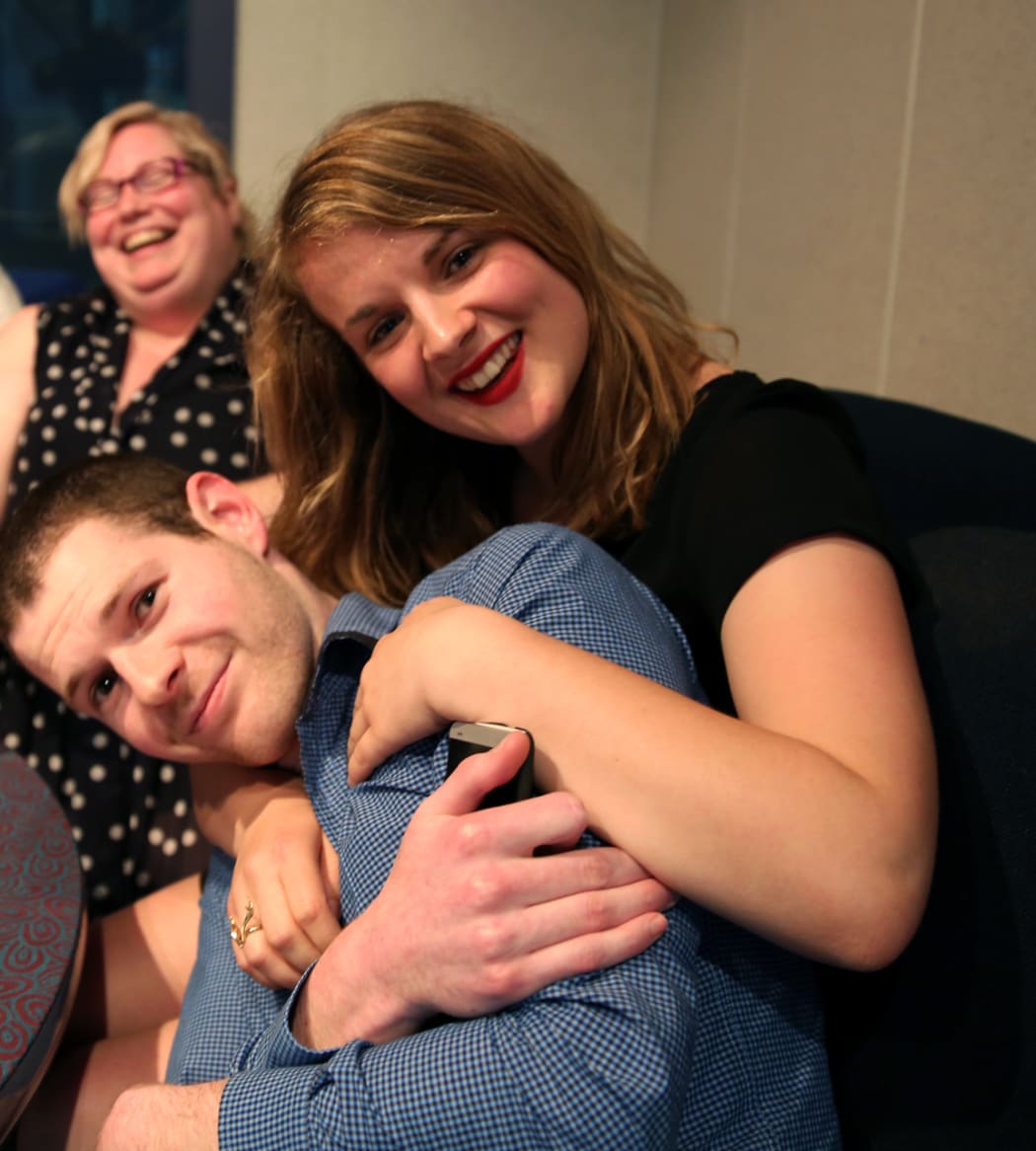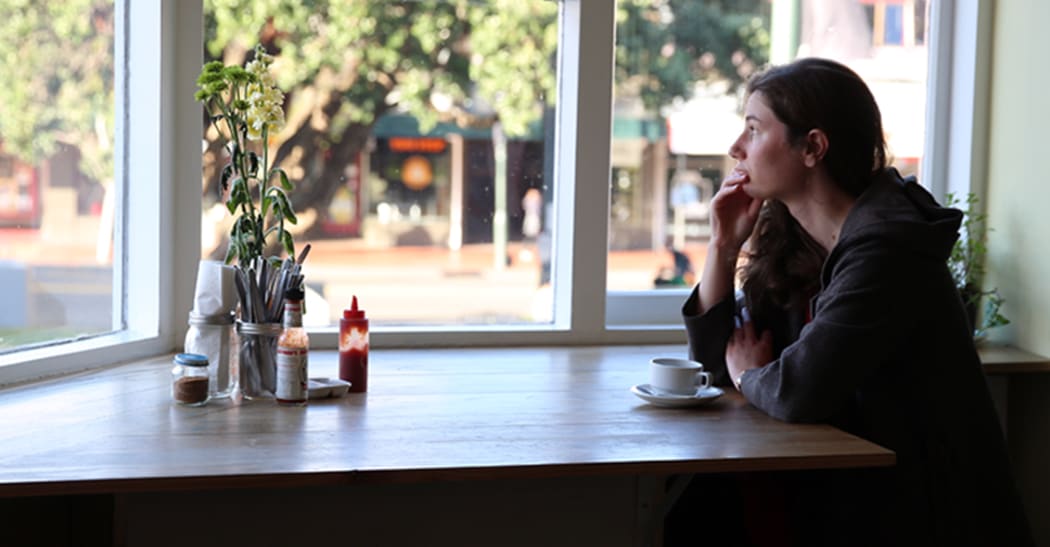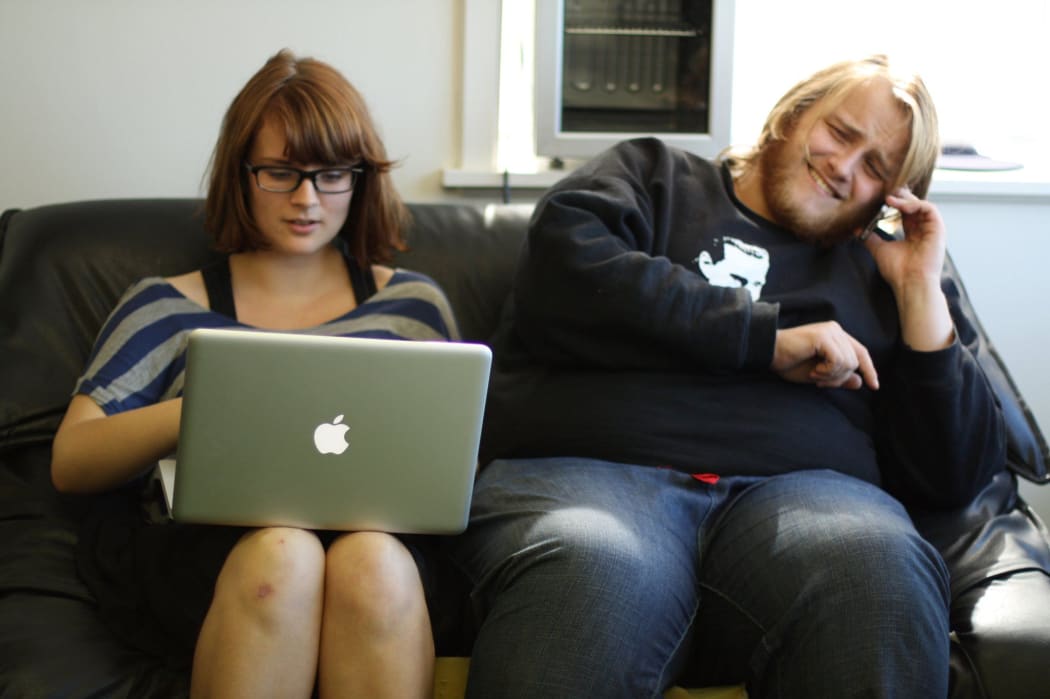If you’d asked me two months ago, I’d have struggled to come up with any plans or goals for 2015, aside from seeing Drake in concert three times in a week in February and preserving my energy for same. Now, with next to no lead-up or planning, I am about to become a statistic (casualty?) of the brain drain to Australia.

When colleagues become good friends: Elle Hunt with Megan Whelan, left, and Craig McCulloch, right Photo: Daniela Maoate-Cox / The Wireless
Like many middle-class, university-educated, ambitious New Zealanders in their mid-twenties, I’d always had vague plans of heading overseas – maybe the UK or the US, maybe for further study – at some point in the future, for no more definite reason than I felt like I ‘should’ before settling here ‘for good’.
It was by no means the best-laid plan, but it went awry all the same. I saw a job advertised with The Guardian in Sydney and I applied on a whim, more or less because I wanted to write the cover letter for it. (I love writing cover letters. I sometimes apply for jobs I don’t want because I felt like writing a cover letter.) (Is this a point on the psychopath test?)
I was pretty sure I was under-qualified. The editor agreed. But there was another vacancy I was better suited to.
And so it’s come to be that I’ve spent the last two weeks casting off my tenancy agreement, the books of new journalism I’d bought with the intention of getting around to reading them ‘one day’, the CDs I hadn’t listened to since I was a teenager but still considered important enough to cart from flat to flat for five years. It’s all been quite cathartic, really.
My departure is Wellington's gain, if you measure in numbers of mid-2000s indie CDs dropped off to the Salvation Army
— Elle Hunt (@mlle_elle) December 15, 2014
But the speed with which it’s happened has made me reflect on the pull out of New Zealand. I’d had no imminent plans to leave; in fact I was just starting to question why I felt like I had to move overseas at all. And yet here we are.
It reminds me of Pip Howells’ piece, one of my favourites we’ve run on The Wireless, about having your friends up and leave you, one by one, and then en masse:
Old friends left. Newer friends left. Acquaintances left. My boyfriend left. A number of my close friends commiserated with me, finished their drinks, and promptly left as well. It became a kind of running joke, and then it made me very boring to talk to. “How was your weekend?” people would ask with trepidation as I delivered story after story of leaving drinks, parties and dinners.
If anecdotal evidence isn’t proof enough that this struck a chord with our readers (I’ve heard of it being brought up unprompted on at least one Tinder date, the bar for success by which we measure all our posts), there are figures to back it up: it became one of the best-read stories we’ve ever run on the site within weeks of its being published. Obviously, many young New Zealanders know what it’s like to grapple with the question of whether to leave or be ‘left behind’. (Quotation marks to acknowledge that I’m glossing over the innumerable, immense pleasures and privileges of living in this country for the sake of a pithy turn of phrase ¯\_(ツ)_/¯)

Pip Howells Photo: Elle Hunt / The Wireless
But digging down into why so many of us leave, and what for, was more difficult. My attempt, through personal stories and social media, drew valid criticism of middle-class and mostly pakeha privilege. As ‘Jade D’ commented, “Why I Left New Zealand: ‘I have above-average intelligence and was born into an environment of privilege’.” (Though, to be fair, many of my interviewees were the first to acknowledge that themselves: “Obviously there is a huge amount of privilege behind me just being able to say ‘I’m bored and I want to be somewhere else’.”)
But the fact remains that New Zealand has one of the largest diaspora of any country in the world. More than half a million people [pdf] who could live here have chosen to base themselves in Australia instead. I can’t think of anyone who hasn’t at least toyed with the idea of moving overseas, and I’m sure that’s not the case for all people in their twenties, the world over. I grew up in England, and the impression I get, at least from sporadic updates through Facebook, is that many of my primary school classmates not only still live there, but in our hometown; the same can’t be said of the people I went to college with in Nelson, a city of only seven thousand fewer people.

Elle Hunt and Uther Dean c. Salient '11 Photo: Rachel Brandon
It’s difficult to write about this without seeming glib or defensive or self-pitying. Of course I’m privileged to be able to up sticks and move to Australia with only a few months’ notice, just as I’ve been privileged to have had the upbringing, education and experience that led to me getting a great job there. That doesn’t mean it’s been an easy decision to leave New Zealand. Nor does it mean that there aren’t aspects of life here that make it hard to stay. (See what I mean?)
The way I see it, it’s hard to put down roots here at a time in life when you already have few permanent ties. I read an article that suggested that the reason so many members of the “Millennial” generation have tattoos is that permanence and the definite are attractive in a world of limitless choice. Though I don’t have any tattoos myself, I can understand the appeal. A acquaintance of mine recently bought a dog just to remove some options for how she’d spend the next decade. (I got the sense from some of the young couples I spoke to for my feature on marriage that that had been one of the drawcards of getting hitched, too.)
Though if you’re in your twenties, middle-class, educated, ambitious, etc. – that caveat again – you’re not thinking about marriage or kids, even if you think you’ve met the person you’d maybe like to take those steps with. In my industry, and I’m sure many others, you can see every rung of the ladder, in part because they’re depleting – and those that do endure are occupied by middle-aged people who show no signs of moving on anytime soon. Where you live is decided by where you can get a job, but you probably can’t afford to buy a house there, and the rental accommodation is over-priced and of average quality at best. (Again! Defensive! Self-pitying! But isn’t it true?)

Photo: Unknown
There are plenty of barriers to committing to life in New Zealand, even if you want to. Why wouldn’t you eye up opportunities elsewhere? The grass might not be greener on the other side, but it might not be more dry, either.
To quote Di White in her feature on the brain drain, “When it came time to leave my job in Auckland, I realised that for every one job in which I was interested in New Zealand, there were ten more interesting and better-paying jobs in Melbourne, and my long-held opposition to ‘crossing the ditch’ quickly dissipated.”
No matter what happens here, I know that moving to Australia will take my career – and not to be melodramatic but maybe even the entire course of events of my life?? – places it couldn’t get to from here. I love New Zealand for many reasons, but even I was a bit surprised to find that when it came down to it, none of them held enough potential or promise for me to turn down what felt like infinite opportunities. (To my friends, family, boyfriend, workmates, if they’re reading: That’s not a neg.)
TL;DR: Today is my last day at The Wireless! And at risk of fronting like I’m bloody Meryl Streep or something as opposed to an online content producer, I want to thank Megan Whelan, who is an exemplary human being, and every one of the contributors who I have worked with in my time at the site. I will live on through Twitter, two hours behind you. No spoilers, please.

